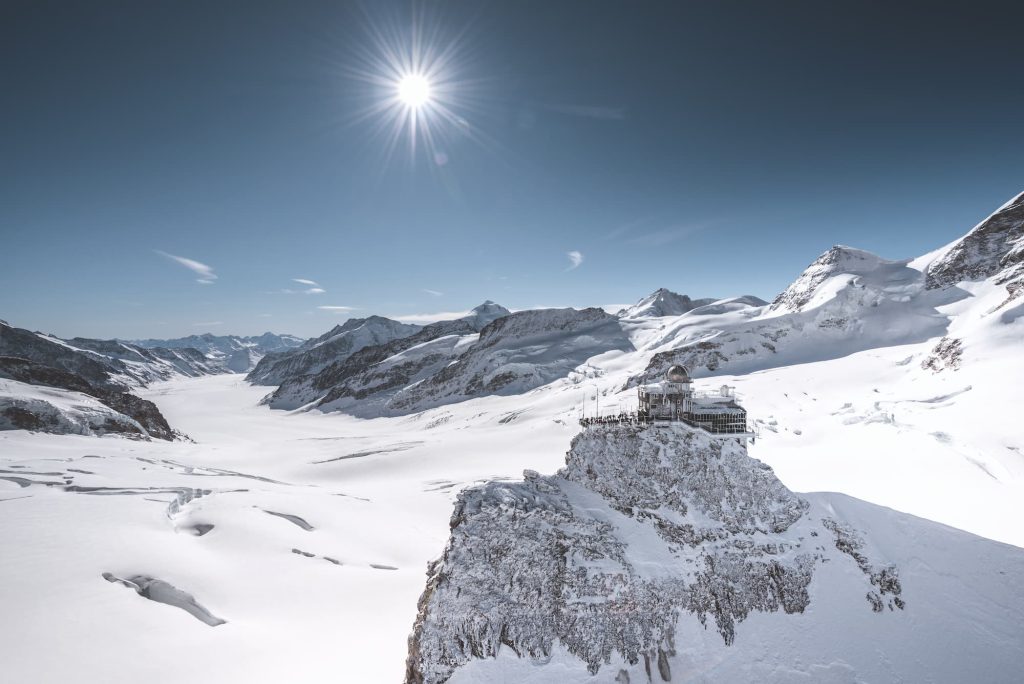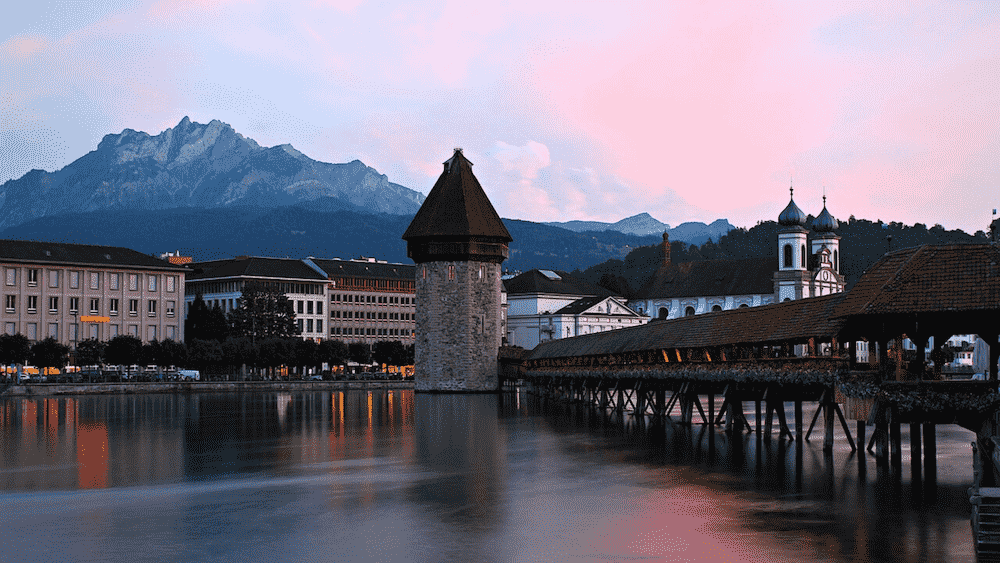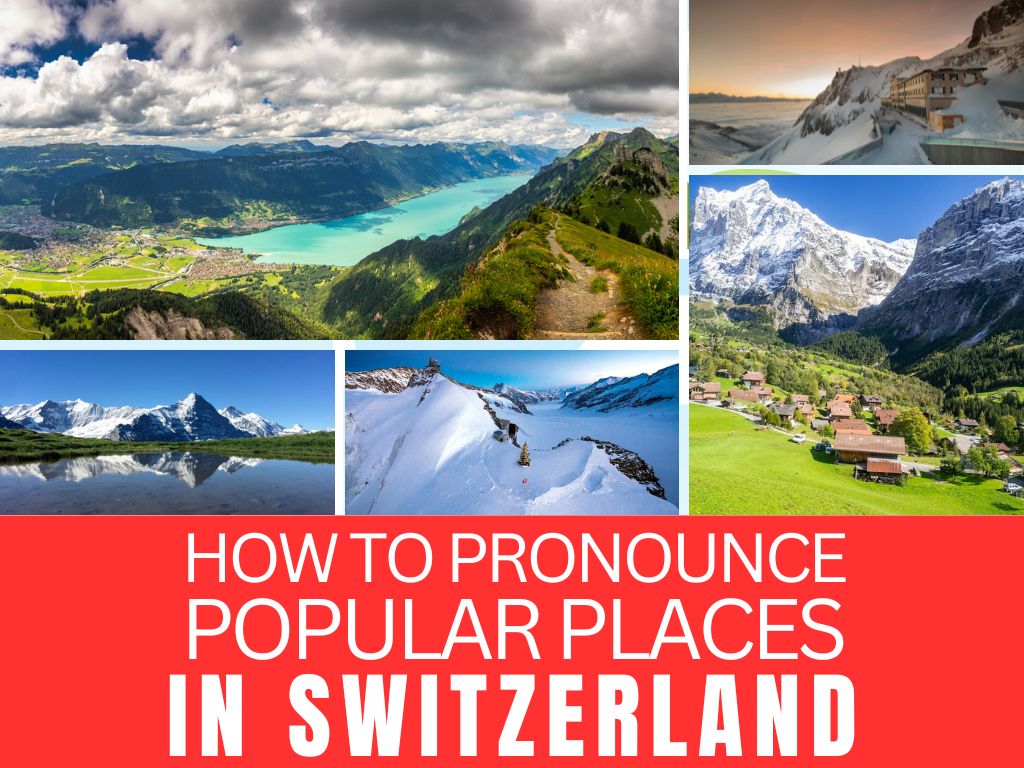If you’re planning a trip to Switzerland, you might be wondering how to pronounce some of the most popular destinations correctly – you are not alone.
Most of my video call consultation clients always say the same thing
sorry, but I have no clue how to pronounce these names, I am likely completely butchering them!
which is completely understandable – given German is hard, and Swiss-German is like German + Scottish!!!
So, I thought I would whip up a quick guide with some examples to help you pronounce things at least relatively correctly (as although I speak both German and English, I am not 100% at German either!).
Here’s a simple guide with familiar English word examples to help you sound more confident when traveling.
Below each is an audio file that will help you understand how to say the names too.

Interlaken
The town of Interlaken in Switzerland is named for its location between two lakes: Lake Thun (Thunersee) and Lake Brienz (Brienzersee). So, “inter” and “laken” is quite easy to remember.
The name Interlaken comes from Latin and means “between the lakes.” It is derived from the Latin words inter (“between”) and lacus (“lake”).
BUT the way you think you pronounce it, is not quite right…
Pronounced: In-ter-lah-ken (like – interlarrrrken)
Think: “inter” like internet, then “lah” like la-la-la, lastly “ken” like Ken from Barbie BUT very short – more like “kun”

Lauterbrunnen
The name Lauterbrunnen comes from Swiss German and means “loud springs” or “clear fountains.” It is derived from two words: lauter (meaning “loud,” “clear,” or “pure” in this context) and Brunnen (meaning “springs,” “fountains,” or “wells”).
The name reflects the village’s geography in the Bernese Oberland of Switzerland, known for its numerous waterfalls and clear streams cascading from steep cliffs.
So, how do you pronounce it correctly?
Pronounced: Low-ter-broon-en
Think: “low” like taking a “bow”, (not low as in low down) then “ter” like term, “broon” rhymes with spoon, “en” like pen.

Grindelwald
The name Grindelwald is actually two words, Grindel + Wald. Wald means forest in German and is pronounced with a “v” instead of “w”
Grindel is from old Swiss-German and they believe it either means ridge or clearing. So, this was the forest by the clearing/ridge.
When you are in the town, you won’t really be thinking about forests though as you look straight up at the majestic 4000m peaks!
Pronounced: Grin-del-vald
Think: “grin” like smile, “del” like a mixture of dull and deli, lastly German “w” is pronouched as a “v” so……“vald” rhymes with halt (soft “d”).

Wengen
Wengen sits high above Lauterbrunnen giving you spectacular views of the valley below.
The name Wengen likely originates from Old High German or local Swiss German, meaning “meadow” or “pasture.” It is derived from a term like wanga or wengi, which refers to a grassy, open area suitable for grazing or farming.
This reflects Wengen’s location in a high alpine valley in the Bernese Oberland, Switzerland, surrounded by meadows and the dramatic peaks of the Jungfrau region, including the Eiger, Mönch, and Jungfrau.
Pronounced: Veng-en
Think: “Veng” rhymes with penguin, “en” like ten. (Note: The “W” is pronounced like a V.)

Mürren
The name Mürren likely derives from Old High German or Swiss German, possibly related to the term mura or muro, meaning “wall,” “ridge,” or “fortification.” This could refer to the village’s dramatic location on a high ledge (at about 1,650 meters/5,413 feet) overlooking the Lauterbrunnen Valley in the Bernese Oberland, Switzerland, with steep cliffs and ridges defining its setting.
Pronouncing the name correctly, is a different matter – especially due to the weird German letter “ü” !!
Pronounced: Mew-ren
Think: “Moo like a cow sound, then “ren” like rent without the “t”.
Want To Save This For Later?

Kleine Scheidegg
You will likely pass Kleine Scheidegg a number of times while in the region as it is the junction of all the trains on the plateau above Grindelwald and Lauterbrunnen and connects you to the train to Jungfraujoch.
The name Kleine Scheidegg comes from Swiss German and translates to “small watershed”.
Pronounced: Kly-nuh Shy-degg
Think: “Kly” rhymes with fly, “nuh” like numb, “Shy” like shy person, “degg” rhymes with egg.

Jungfraujoch
The name Jungfraujoch comes from Swiss German and translates to “Jungfrau saddle.” It is derived from Jungfrau (meaning “virgin” or “maiden,” referring to the nearby Jungfrau mountain) and Joch meaning “saddle”. It sits next to the Jungfrau mountain forming a ridge to the Monch mountain next door.
This is one of the hardest words to get right – start with the fact that Js are Ys in German. That should get you started…
Pronounced: Yoong-frow-yock (Note: “J” is pronounced like Y in German.)
Think: “Yoong” does not really match anything in English – just start with a “Y” then a long “oooong”, then add “frow” rhymes with cow, and “yock” rhymes with rock.

Thun
The name Thun likely comes from a Celtic root, possibly dun or dunum, meaning “fort” or “fortified settlement.”
This makes sense when you think about the town’s strategic location on the Aare River in the Bernese Oberland, Switzerland, near Lake Thun (Thunersee).
Pronounced: Toon
Think: “Toon” like cartoon. (but a lot faster/shorter) (Note: “Th” is pronounced like T.)
Brienz
The name Brienz also likely coes from a Celtic root, perhaps brig or bri, meaning “hill,” “rise,” or “fortified place.”
Pronounced: Bree-enz
Think: “Bree” like brie cheese, “enz” rhymes with pens.

Lucerne
The name Lucerne (Luzern in German) most likely comes from luk or loz, meaning “marsh,” or “swamp,”.
This highlights the city’s location on the shores of Lake Lucerne (Vierwaldstättersee) and the Reuss River in central Switzerland where it was probably marshy when the city was first founded.
Pronounced: Loo-sern
Think: “Loo” like loo (bathroom), “sern” rhymes with burn.

Pilatus
This local Lucerne mountain has been talked about since antiquity and likely named by early inhabitants or Roman-era settlers. Its name appears in medieval records as Mons Pilatus or similar, perhaps reflecting its prominent, cloud-shrouded summit.
For us though, Pilatus became a tourist destination with the construction of the Pilatus Railway (opened 1889), the world’s steepest cogwheel railway, connecting Alpnachstad to the summit. So, people have been catching this train up to the mountain top for over 130 years!
Pronounced: Pee-lah-toos or Pih-lah-tus
Think: “Pee” like peek (or “Pih” like pin), “lah” like la-la-la, “toos” like moose.

Zermatt
The name Zermatt comes from Swiss German and is derived from the terms zur (meaning “at” or “toward”) and Matt (meaning “meadow” or “field”). So Zermatt means “at the meadow” or “on the meadow,” which befits its location in a high alpine valley surrounded by meadows and pastures at the foot of the Matterhorn in the Pennine Alps, Switzerland.
Pronounced: Zer-maht
Think: “Zer” like sir, “maht” kinda like “mat” but with a more open “a”.



You are very sweet, kind, knowledgeable and generous with your time. I live in Calgary, Alberta, Canada and hope to visit your adopted Country of Switzerland. It looks like a beautiful place to visit.
Sincerely,
Alma-Jean Nippard
I was really hoping you would Pronounce ‘Schynige Platte’. Also the audio for Lauterbrunnen is completely mispronounced after the word explination that was written. Sounds just like I say it. Lol.
I do my best, I had to use an AI pronounce tool for the moment as my partner who is better at it then me was on a work trip :>